Brother
Professional
- Messages
- 2,590
- Reaction score
- 533
- Points
- 113
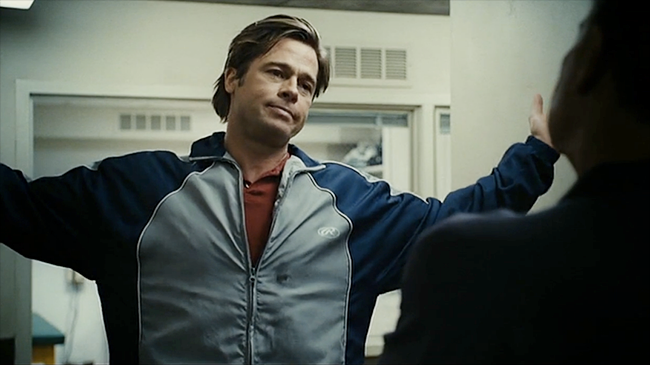
In life, every second something changes: from small everyday changes to global ones. The doctor has forbidden you to eat tomatoes, and you love them terribly. Before the merger, an employee who was in charge of documentation quit. The euro rate has gone up, and you have a travel company. What kind of change is irrelevant. What matters is how you act in times of change.
- In 1916, at the height of the First World War, the BMW automobile brand manufactured aircraft engines. Together with German aircraft manufacturer Gustave Otto, BMW provided the Triple Alliance's aviation fleet.
- After the war in 1919, the Versailles Peace Treaty banned the production of aircraft in Germany. Otto closed the factory. The management of BMW calmly accepted the change and in the same year began to manufacture brakes for trains.
- Later, the BMW plant produced motorcycles and only after them - world-famous cars. If the company's management was afraid of change, perhaps we would not know this brand of cars.
Most of the changes are beyond our control. They just happen. We can either complain about why our company went bankrupt, or adapt to the new conditions. This is not easy to do, but it is possible with the right approach.
This newsletter is useful for company executives and employees. The first is to learn how to recognize the coming changes in time and adjust the work of the company. The second is to adapt to changes within the company.
Fairy tale for adults
How to treat changes calmly, written - rewritten. Authors of books and articles on this topic give psychological advice from the category: "Set yourself up mentally for change." Yes, such books are motivating. For two or three days. Then you forget about them.At first glance, Spencer Johnson's book Who Stole My Cheese? - one of those books with a post-effect for a minute. But it only seems so.
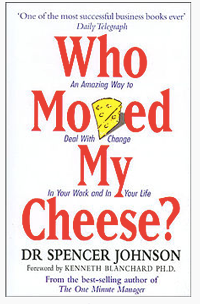
In the center of the book is a fairy tale. In the fictional country "Labyrinth" there are two mice and two people. Every day they run through the labyrinth in search of cheese, find it and enjoy their prey. But soon the cheese disappears. Further, the author describes how the heroes behave in this situation.
An ordinary tale. Nothing special. I did not understand why the leaders of Western companies buy books in boxes and distribute them to subordinates. But recently I came across an article by the American business coach Lex Sisney, in which he wrote about the book "Who Stole My Cheese?"
This was not your usual “buy, cool book, motivate” description. Lex Sisney argues that the heroes of the fairy tale show the universal reactions of a person to change.
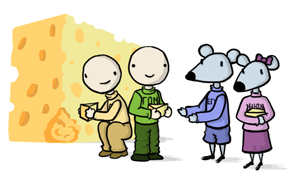
Looking for cheese
First of all, companies are throwing their energy into finding their piece of cheese. Cheese is what we strive for. For a manager, cheese can be market share, number of clients, profit margins. For an employee - career advancement, bonuses for work performed.Like the inhabitants of the Labyrinth, we run through the corridors every day in search of our piece. We just choose different search methods. According to this principle, the author divided the heroes of the tale into two pairs: people and mice.
The mice Scent and Runner searched for cheese instinctively, by touch: they ran down one corridor - it was empty, headed for the next. In humans, instinct replaces intuition. Only this is not the kind of intuition that is called the sixth sense, but a reasoned mental reaction. A special flair that is based on experience. You get it from past jobs, books, TV shows. At the most unexpected moment, this instinct suggests the right decision.
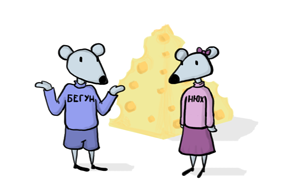
An intuitive approach is more often used by company leaders when there is no time for thought. With an intuitive approach, you cannot predict the outcome. You use it to figure out which direction to go by trial and error.
- In 2012, Russian print media were losing their audience. People no longer need to spend money on newspapers and magazines, because the same thing is on the Internet. The world around has changed, and the publishing houses have also changed.
- In 2013, an ordinary domestic cat appeared on the cover of Vokrug Sveta magazine, for the first time in 150 years of its existence. The article explained the behavior of a familiar animal from a scientific point of view. Cat magazine showed a 23% jump in audience.
- Thanks to a series of intuitive decisions, over the course of a year, the magazine's management groped a new direction of development - stories about familiar things in an unusual perspective, and stopped the decline in the audience.
There are many successful examples of this intuitive approach. At 16, a boy named Richard founded a student magazine. At the age of 20, in one of the issues of the magazine, he put music discs that he bought on the cheap because of defective packaging. A random promotion worked: readers began ordering CDs by mail. As a result, Richard opened the largest music company in London "Virgin" and became a billionaire Richard Branson.
Branson acted intuitively, and it worked. Steve Jobs often adhered to the same principle in his work. They did not rely on analytics, but did as they saw fit. If the method works, good. No, no, no. Let's try something else.
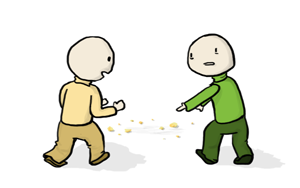
People Gom and Mon from the fairy tale relied on intellectual abilities: they drew up a plan of the Labyrinth and marked the corridors in which they had already visited.
Most companies use an intelligent approach. Before releasing a product, they conduct surveys, analyze the market. An intelligent approach requires more resources: time and money. But you know exactly when and what result you will get.
- The new Megaplana mobile application was developed for five months, and the opinions of the audience were collected and the market analyzed for two years. Thanks to this, the application was made the way customers wanted it to be.
With an intellectual approach, the value of a piece of cheese increases. The more effort you put into achieving a result, the more valuable that result is. If you suddenly lose a piece of cheese, disappointment will drive you into a stupor.
- Let's say you have a yoghurt factory. One day, the Ministry of Health announced that children under 10 need to eat three yoghurts a day to improve memory. Mommies rush to the shops. Yoghurt companies produce tons of products. The competition is unprecedented.
- They all produce yoghurts with the same flavors: pineapple, vanilla and chocolate. To beat the competition, you need to produce yogurt with an unusual taste. To find out which taste will appeal to children better, you invest in research, polls, focus groups.
- Several months pass and analysts call you the winning taste - cherry. You double your production. The batch is ready to be sent to stores. And here the Ministry of Health declares that yoghurts improve memory, but worsen vision.
- You have invested all your money in the production of cherry yogurt, but no one else needs it. If you didn't spend time and money on research, but used an intuitive approach - you released five yoghurts with flavors that competitors do not have, you would have had time to make a profit before customers stopped buying yoghurts.
Intelligent and intuitive approaches work, but in different situations. In a stable market situation, when you have time, it is better to use an intelligent approach. It is more accurate. In a period of change - to act promptly, so an intuitive approach will help here.
Flush
With cheese in your pocket, you need to figure out how to handle it. The tale describes two of the most common strategies that people follow to achieve success.The first is to use proven paths to achieve results. The second is to enjoy success. The first strategy was used by mice. The second is people. Let's take a closer look at the pros and cons of each strategy.
Mouse strategy:
Pros Cons In a fairy tale: continue to run in the maze.
In life: they continue to work In a fairy tale: theyrun to the cheese the same way as before.
In life: they are not looking for new ways to increase capital and develop a business
In a fairy tale: cheese is checked every day.
In life: watch for changes
In a fairy tale: they notice that the smell of the cheese has changed, but they do nothing.
In life: they hope that changes will bypass them In a fairy tale: they do not attach importance to the found cheese.
In life: do not increase the significance of the achieved success
- People strategy:
Pros Cons - In a fairy tale: they stopped keeping themselves in shape.
In life: stopped working -
In a fairy tale: cheese supplies are not checked.
In life: do not follow the changes -
In a fairy tale: they decided that cheese would provide them with life.
In life: overestimate the significance of the achieved success The strategy of people is clearly a losing one. They live in the present and do not think about the future.
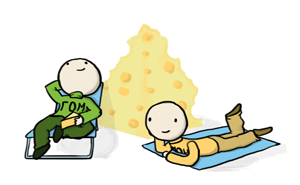
The mouse strategy is more complicated. There seems to be nothing wrong with her. The mice work hard and take care of the cheese, but their mice profits will never increase. Yes, they work every day. But in order not to lose and increase a piece of cheese, you need to look for new approaches and take into account changes that do not depend on you.
- In 2007, Nokia accounted for over 40% of all mobile phone sales worldwide. But consumers began to give preference to touchscreen phones. The management of the company did not pay attention to this change.
- In mid-2007, Apple began selling iPhones, and Nokia's market share declined rapidly, and the company's revenues plummeted. In 2008, Nokia released the first touchscreen phone. But it was too late. The company did not succeed in regaining its former positions. By the end of 2013, Nokia's handbook had sold its mobile phone division to the American company Microsoft.
If the cheese rots, and it is impossible to stop this process, you need to look for a new one. While the old one has not yet deteriorated, you have time to search.
The cleverest
Change is inevitable. Success cannot last forever, just because you want to. There will always be those who will become more successful than you if you yourself do not change.In any field, there are specialists who were strong professionals at the beginning of their careers. But they are too conservative, do not want to change and act in the old fashioned way. When a specialist comes ready to change, he takes the place of the old man and succeeds.
Once the heroes of the fairy tale discovered that their bases were empty. The mice were not surprised. They knew the cheese was spoiling and were ready for a change. Therefore, they immediately rushed in search of new cheese. And soon they found him and continued to lead their usual way of life. People panicked. They ran from one corner of the base to another, looking for traces of thieves and shouting: “Who stole our cheese? This is unfair! "
It happened because Gom and Mon made mistakes from the very beginning. The situation in the Labyrinth was unstable: no one knew where the cheese came from and when it would disappear. But people used an intellectual approach, so the value of the cheese increased. People were convinced that this cheese is the most important thing in their life, and they don't need anything else. Therefore, the loss became a tragedy for them.
- In the early 2000s, businessman Derek Sivers created the Sidi-Baby online music store. The store soon became the largest independent music store with a turnover of one hundred million dollars. But by 2008, sales and revenues had declined. Derek had to sell it while it was still worth something.
- Instead of investing the proceeds in a new business, Derek threw himself into blaming employees. He began to write a book about the subordinates who ruined the company.
- While Derek was writing the book, he realized that the reason for the failure of the business was not at all the employees, but himself. Instead of an angry book, the future bestseller "It's All Because of Me" was published. Derek shared his thoughts and inspired millions of people.
It took Derek Sievers three years to get used to the change and change himself. Only then did he find a new piece of cheese.
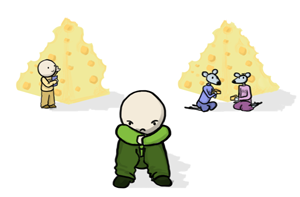
In the tale, Gom was unable to cope with the change. And he stayed at the old base. But Mon has changed. He went to the labyrinth alone and found a new cheese. Mon took into account the mistakes that mice and humans made. I stopped thinking about the past cheese and checked a new one every day. Mon continued to work, often went out on exploration in the labyrinth. If this cheese goes missing, Mon knows what to do.
Fairy tale lessons
"Who Stole My Cheese?" - a little story. But there is much more useful advice in it than meets the eye. It remains only to find them. Like cheese.Here are some of the lessons I learned from the tale. Maybe they will be useful to you too.
The cheese disappears. Change happens without our desire. Remember this, then the disappearance of your piece of cheese will not be a tragedy for you.
Your cheese is not the only one. You succeeded, you got what you wanted. But this is not the only thing you have. Gom bet on unfortunate pieces of cheese and lost.
Crying over cheese is a waste of time. The longer you lament for lost success, the less likely you are to get out of this pit. The loss of cheese is not a reason to give up. You have you. Take action.
Going forward alone isn't that scary. Support is important. But you can't wait for it. If you have an idea, but no one believes in it, try to implement the idea yourself. Either it works or it doesn't. You have nothing to lose. When my friend, an economist by training, quit his high-paying job and started a production company, I twisted my finger to my temple. Nobody believed in the friend's idea. Two years have passed. He makes documentaries for Channel Five and smiles sarcastically when I admire his achievement.
Competitors are not enemies. The behavior of the mice spurred Mona to action. Take a look at what your competitors are doing. Consider the pros and cons. Eliminate the cons, take advantage of the pros, add your own and make it better.
The cheese goes bad, but you can always find a new one. If you feel the cheese is spoiling, don't wait for it to rot. Look around, try new things. After leaving my last job, I didn't know what I wanted to do. Therefore, I agreed to different options: I worked as a PR specialist, wrote advertising articles, filmed video clips and even wrote a script for a commercial. I did what I can.

